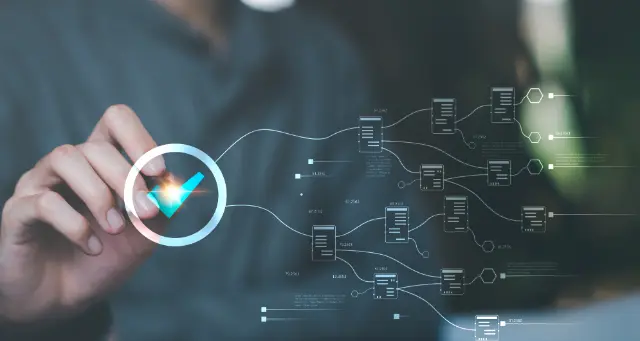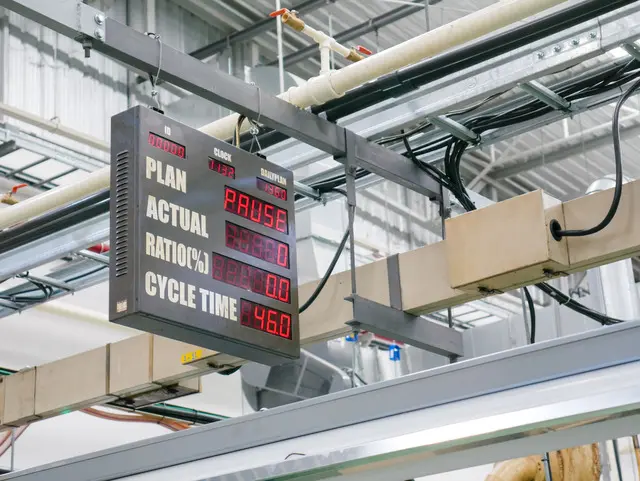Revolutionizing Production Progress Reporting with Automation
In the fast-paced manufacturing industry, accurate and timely progress reporting is crucial for optimizing operations and ensuring efficiency. However, manual reporting processes are often prone to errors, delays, and inconsistencies. Production Progress Reporting Automation emerges as a game-changer, empowering manufacturers with the ability to automate the generation of progress reports based on real-time data and pre-defined templates.
Python, with its robust data manipulation capabilities, combined with the power of AI and cloud-based solutions, provides a comprehensive solution for Production Progress Reporting Automation. This automation streamlines the reporting process, eliminates human errors, and ensures real-time visibility into production progress, enabling manufacturers to make informed decisions and improve overall productivity.

Python, AI, and Cloud: Powering Production Progress Reporting Automation
Python, with its extensive library ecosystem and ease of integration with other tools, is the ideal language for developing both unattended and attended bots for Production Progress Reporting Automation.
Unattended bots can run autonomously, 24/7, to collect data from various sources, such as sensors, machines, and enterprise resource planning (ERP) systems, and generate progress reports based on pre-defined templates. These bots can be scheduled to run at specific intervals or triggered by events, ensuring timely and consistent reporting.
Attended bots, on the other hand, work in collaboration with human users. They can assist users with data entry, calculations, and report generation, providing real-time guidance and reducing the risk of errors. Attended bots can be customized to meet the specific needs of each user, making them highly versatile and adaptable.
Cloud platforms offer a wide range of services and features that make them ideal for Production Progress Reporting Automation. These platforms provide scalable and reliable infrastructure, advanced data analytics capabilities, and pre-built AI models. Unlike traditional RPA/workflow tools orchestrators, cloud platforms offer far more capabilities as automation orchestrators, enabling the seamless integration of different automation components and the management of complex workflows.
AI plays a crucial role in enhancing the accuracy and efficiency of Production Progress Reporting Automation. AI techniques, such as image recognition, natural language processing (NLP), and Generative AI (Gen AI), can be incorporated into automation scripts to handle complex tasks and edge cases. For example, image recognition can be used to automate the analysis of production line images and identify defects, while NLP can be used to extract insights from unstructured data, such as production logs and reports. Gen AI can be used to generate customized reports and provide recommendations based on historical data and industry best practices.
By leveraging the combined power of Python, AI, and cloud platforms, manufacturers can achieve Production Progress Reporting Automation that is accurate, efficient, and scalable, ultimately leading to improved decision-making, increased productivity, and reduced costs.

Building a Robust Production Progress Reporting Automation with Python
Developing a robust Production Progress Reporting Automation solution using Python and cloud involves the following steps:
- Data Collection: Integrate Python scripts with sensors, machines, and ERP systems to collect real-time production data, including machine status, production output, quality metrics, and other relevant information.
- Data Processing: Use Python’s data manipulation and analysis libraries to clean, transform, and aggregate the collected data into a structured format suitable for reporting.
- Report Generation: Leverage Python’s templating engines and reporting libraries to generate progress reports based on pre-defined templates. These reports can be customized based on specific user requirements and exported in various formats.
- Automation Orchestration: Utilize cloud platforms as automation orchestrators to manage the execution of the automation scripts and ensure seamless integration with other systems and services.
- Monitoring and Control: Establish monitoring mechanisms to track the performance of the automation solution and make necessary adjustments based on real-time insights.
Data security and compliance are paramount in the manufacturing industry. Python provides robust encryption and authentication mechanisms to protect sensitive data throughout the automation process. Cloud platforms offer enterprise-grade security measures, such as access controls, data encryption, and compliance certifications, ensuring the highest levels of data protection.
Compared to no-code RPA/workflow tools, building Production Progress Reporting Automation with Python offers several advantages:
- Customization: Python allows for highly customized automation solutions tailored to the specific needs of manufacturers.
- Scalability: Python scripts can easily scale to handle large volumes of data and complex reporting requirements.
- Integration: Python integrates seamlessly with a wide range of third-party systems and services, enabling end-to-end automation across the manufacturing ecosystem.
Algorythum takes a unique approach to automation, recognizing the limitations of off-the-shelf RPA tools and the growing dissatisfaction among clients with their performance. By leveraging Python and cloud platforms, Algorythum delivers bespoke automation solutions that are flexible, scalable, and tailored to the unique challenges of the manufacturing industry.

The Future of Production Progress Reporting Automation
The future of Production Progress Reporting Automation holds exciting possibilities for manufacturers looking to further enhance their efficiency and productivity. Emerging technologies, such as:
- Edge Computing: Bringing computation and data storage closer to the production line, enabling real-time analysis and decision-making.
- Digital Twins: Creating virtual replicas of production processes to simulate and optimize operations, improving progress reporting accuracy.
- Predictive Analytics: Leveraging machine learning algorithms to forecast production trends and identify potential bottlenecks, enabling proactive reporting and planning.
Algorythum is at the forefront of these advancements, actively exploring and integrating these technologies into our Production Progress Reporting Automation solutions. By subscribing to our newsletter, you’ll stay updated on the latest industry-specific automation trends and receive exclusive insights into how these future technologies can benefit your manufacturing operations.
Don’t hesitate to contact our team for a free feasibility assessment and cost estimate tailored to your specific requirements. Together, we can unlock the full potential of Production Progress Reporting Automation and drive your manufacturing business towards greater success.

Algorythum – Your Partner in Automations and Beyond
At Algorythum, we specialize in crafting custom RPA solutions with Python, specifically tailored to your industry. We break free from the limitations of off-the-shelf tools, offering:
- A team of Automation & DevSecOps Experts: Deeply experienced in building scalable and efficient automation solutions for various businesses in all industries.
- Reduced Automation Maintenance Costs: Our code is clear, maintainable, and minimizes future upkeep expenses (up to 90% reduction compared to platforms).
- Future-Proof Solutions: You own the code, ensuring flexibility and adaptability as your processes and regulations evolve.









